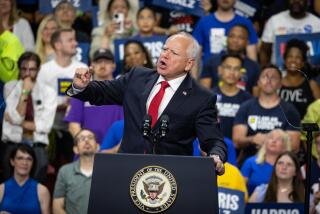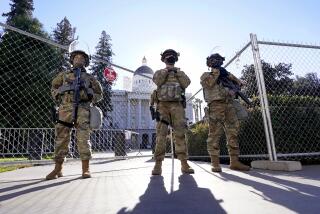Guardsmen, Soldiers Back Quayle, Call Flap Over Service Media-Made
- Share via
Dan Quayle, blond and Redfordesque, and bespectacled Andrew Strauss, who would never be mistaken for a matinee idol, have something in common. Both used connections to try to get into the National Guard during the Vietnam War.
“Do I feel bad because I knew someone?” asked Strauss, a first sergeant with the 40th Infantry Division (M) of the guard, based in West Los Angeles. “No. I was in school then. Maybe down deep I didn’t want to go” to Vietnam.
Nonetheless, he said, “I feel I’m as much a patriot as the men who went to Vietnam.”
Other guardsmen questioned at a family day picnic Saturday agreed with Strauss, contending that Quayle should not be forced to step down as the Republican vice presidential nominee just because his family had wealth and influence. Quayle has said that when he was 22 he met with a former Indiana National Guard commander, employed by his family, to express interest in joining the guard.
Lesser Chance of War Duty
He subsequently was admitted to the guard, avoiding the possibility of being drafted into the regular Army. Though National Guard units did go to Vietnam, the chances of winding up there were much higher in the Army.
Members of the guard unit who did go to Vietnam seemed to be more critical of the press than of Quayle’s actions. “This has been blown way out of proportion,” said Sgt. Bruce Jukes, 41, who went to Vietnam with the Army in 1965 and joined the guard later.
“At least he didn’t run to Canada,” he said, referring to the fact that some people, to avoid military service then, fled the country.
Other guardsmen felt the controversy has besmirched the reputation of the National Guard. “People are making the National Guard out to be an inferior service, but its history extends back to the 1700s,” said Pfc. Robin Fisher, 23. She said her unit recently went through a two-week desert training exercise that was more challenging than basic training.
Although she said she would “oppose” Quayle’s using family influence to avoid being drafted into the military, she would not censure him all these years later.
“Why should some little thing in the past affect” the present? she asked. “Hopefully, with age comes wisdom and maturity.”
Sgt. Ralph Howell won two Purple Hearts for wounds received in Vietnam with the Marines in 1967-68. “Maybe 20 years ago, I might have questioned” Quayle’s actions, he said.
But he said there’s nothing wrong with wanting to finish school instead of shipping out to Southeast Asia. Further, he pointed out that many National Guard units ended up in Vietnam anyway.
“If they’d have activated his unit” he’d have gone, Howell said.
‘Not the Only One’
“He’s not the only one” who went into the guard instead of the other services, said guardsman Robert Thomas.
But some have asked whether a man running for the nation’s second highest office shouldn’t be held to a higher standard than others.
“Absolutely not,” said Sgt. Frank Kowalski, who served in the regular Army from 1964 to 1969, though not in Vietnam. “A good man looks at his alternatives, puts his priorities in order, and makes the best choices.”
But what does that say about people who did not have connections like the ones used by Strauss and Quayle? People whose alternatives did not include access to influential people? Does this show that life is not equal for everyone in the United States?
“It’s not,” Kowalski said simply.
More to Read
Get the L.A. Times Politics newsletter
Deeply reported insights into legislation, politics and policy from Sacramento, Washington and beyond. In your inbox twice per week.
You may occasionally receive promotional content from the Los Angeles Times.










